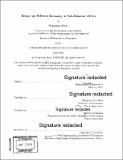Essays on political economy in Sub-Saharan Africa
Author(s)
Marx, Benjamin
DownloadFull printable version (15.17Mb)
Other Contributors
Massachusetts Institute of Technology. Department of Economics.
Advisor
Benjamin A. Olken and Daron Acemoglu.
Terms of use
Metadata
Show full item recordAbstract
The first chapter explores the disciplining effect of elections on national leaders in Sub-Saharan Africa. I first show that the completion of development projects funded by the World Bank and implemented by governments between 1995 and 2014 yields large electoral benefits for incumbent politicians. The causal effect of completion is identified from an instrumental variables strategy that exploits exogenous variation in the workload of project team leaders at the World Bank. Incumbents are rewarded for completing projects in visible sectors, namely projects providing basic infrastructure and social services, but not for completing projects in other sectors. I then show that governments expedite completion in response to electoral incentives, target their effort towards visible projects, and prioritize completing ongoing projects over initiating new projects before elections. Even in Africa's hybrid political regimes, elections incentivize politicians to deliver tangible policy outputs. In the second chapter, Tavneet Suri, Thomas Stoker and I provide evidence of ethnic patronage in the determination of rental prices and investments in one of Africa's largest informal settlements, the Kibera slum in Nairobi. Slum residents pay higher rents and live in lower quality housing (measured via satellite pictures) when their landlord and locality chief belong to the same ethnicity. We find opposite effects when residents and chiefs are co-ethnics. Our identification relies on the exogenous appointment of chiefs and is supported by several tests, including a regression discontinuity design. In the third chapter, Christopher Blattman, Horacio Larreguy, Otis Reid, and I study a large randomized controlled trial designed to combat vote-buying in the 2016 Ugandan elections. Our design allows us to estimate how the effects of the campaign against vote-buying vary with local treatment intensity. We find that the campaign did not reduce the extent to which voters accepted cash and gifts from politicians, but that it had large effects on vote shares received by candidates. Consistent with these effects, we show that the campaign diminished the effectiveness of vote-buying transactions by shifting local social norms against vote-selling.
Description
Thesis: Ph. D., Massachusetts Institute of Technology, Department of Economics, 2018. Cataloged from PDF version of thesis. Includes bibliographical references (pages 199-208).
Date issued
2018Department
Massachusetts Institute of Technology. Department of EconomicsPublisher
Massachusetts Institute of Technology
Keywords
Economics.